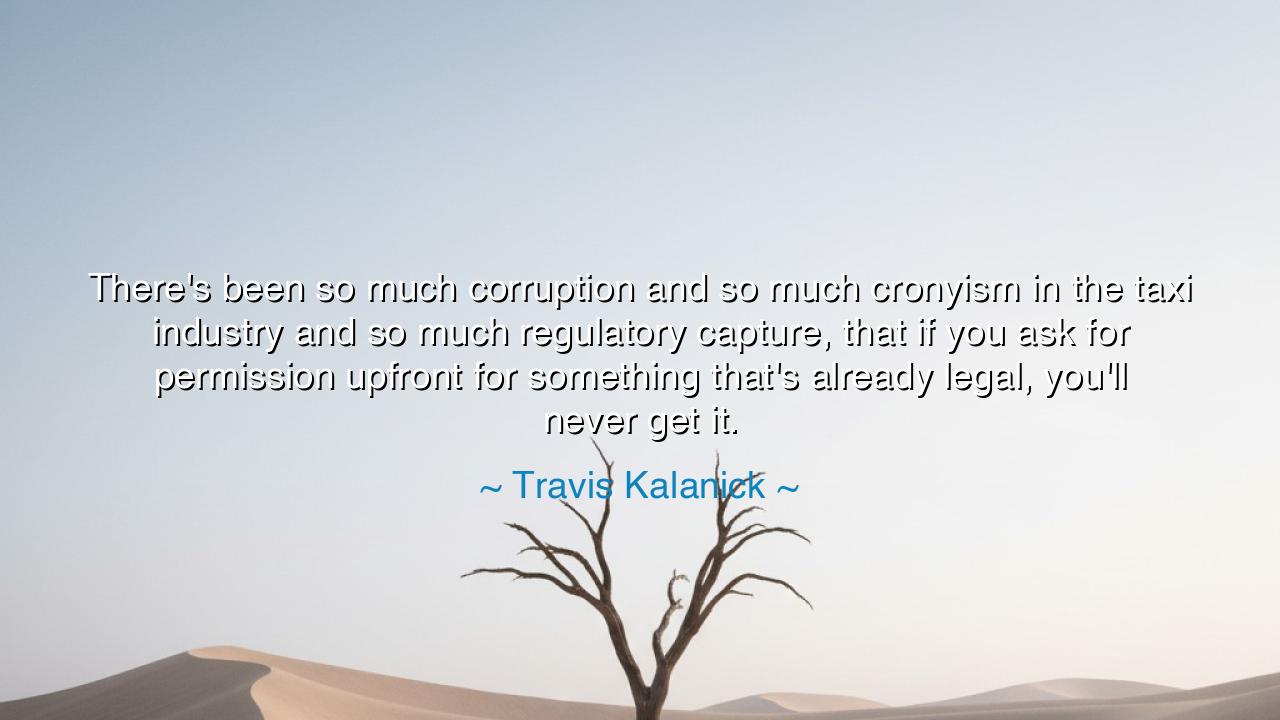
There's been so much corruption and so much cronyism in the taxi
There's been so much corruption and so much cronyism in the taxi industry and so much regulatory capture, that if you ask for permission upfront for something that's already legal, you'll never get it.






In the ancient rhythm of human enterprise, there comes a time when corruption, cronyism, and regulatory capture—those silent thieves of progress—rise like vines to choke the tree of innovation. The words of Travis Kalanick, founder of Uber, are not merely a critique of one industry, but a parable for all ages: "There's been so much corruption and so much cronyism in the taxi industry and so much regulatory capture, that if you ask for permission upfront for something that's already legal, you'll never get it." His lament speaks to the eternal struggle between the creators who move the world forward, and the gatekeepers who seek to preserve their privilege. It is a warning, a cry, and a challenge—to act boldly, even when the system pretends to grant fairness but hides its claws behind the veil of bureaucracy.
In these words lies the echo of a truth older than civilization itself: that power fears disruption. When innovation arises—whether it be fire in the hands of mortals, the printing press in the age of monarchs, or the automobile in the time of horsemen—those who hold dominion over the old order resist. Kalanick, through the creation of Uber, dared to challenge the entrenched monopoly of city-sanctioned taxis, a realm governed by licenses traded like gold and permissions guarded like fortresses. His battle was not only against outdated laws, but against the invisible web of favoritism and mutual gain that bound regulators and the regulated in a dance of mutual preservation.
Consider the tale of Galileo Galilei, the astronomer who peered into the heavens and declared that the Earth was not the center of the universe. His findings were legal to study, his telescope an instrument of pure science, yet when he sought permission to proclaim truth, he was met with silence, resistance, and imprisonment. The guardians of the old world feared not the stars but the shifting of power they symbolized. Galileo’s struggle mirrors Kalanick’s own: both men stood before institutions steeped in tradition and corruption, and both found that progress often requires defiance, not consent.
The phrase “regulatory capture” is a cold, modern term, but its spirit is ancient. It is the moment when rulers and the ruled become one, when laws meant to protect the people instead serve the powerful. In ancient Rome, public officials often bent to the will of merchants who filled their coffers, shaping edicts that favored their allies. In the medieval guilds, craftsmen who wished to innovate found themselves bound by rigid codes enforced by those who feared competition. Kalanick’s insight reminds us that when the guardians of fairness become the agents of stagnation, true progress can only be achieved by those brave enough to act first and ask forgiveness later.
Yet, there is danger in this fire. To act without permission requires not only courage, but moral clarity. For rebellion can birth both light and shadow. Kalanick’s words should not be read as a call for lawlessness, but as a testament to visionary defiance—the kind that arises when the law itself has been twisted away from justice. Just as Prometheus stole fire from the gods not for personal glory but for mankind’s advancement, innovators must ensure their boldness serves humanity and not merely their ambition.
From the history of invention and revolution, we learn that progress does not knock politely—it breaks through the door. The Wright brothers did not wait for air-safety regulations before taking flight; Alexander Graham Bell did not seek permission to transmit the first voice over a wire. In every age, those who waited for approval from a corrupt system found themselves buried beneath it. Kalanick’s lesson is thus both warning and wisdom: when permission becomes a tool of control, only the bold can reclaim the right to act freely.
And so, to the generations that follow, this truth must be preserved: do not ask permission from those who profit from your silence. Seek justice, not favor. Build with integrity, not apology. For in every era, there will be those who use regulations as shields to protect their power, but there will also be dreamers who see beyond the walls. Let Kalanick’s words remind you that the greatest revolutions often begin not with a signature, but with an act of courage.
In the end, the lesson is clear: when corruption clouds the gate of progress, righteousness demands motion. Act with wisdom, act with purpose, and act even when the gatekeepers say “wait.” For history belongs not to those who obey without question, but to those who rise when the world has forgotten how to move.






AAdministratorAdministrator
Welcome, honored guests. Please leave a comment, we will respond soon